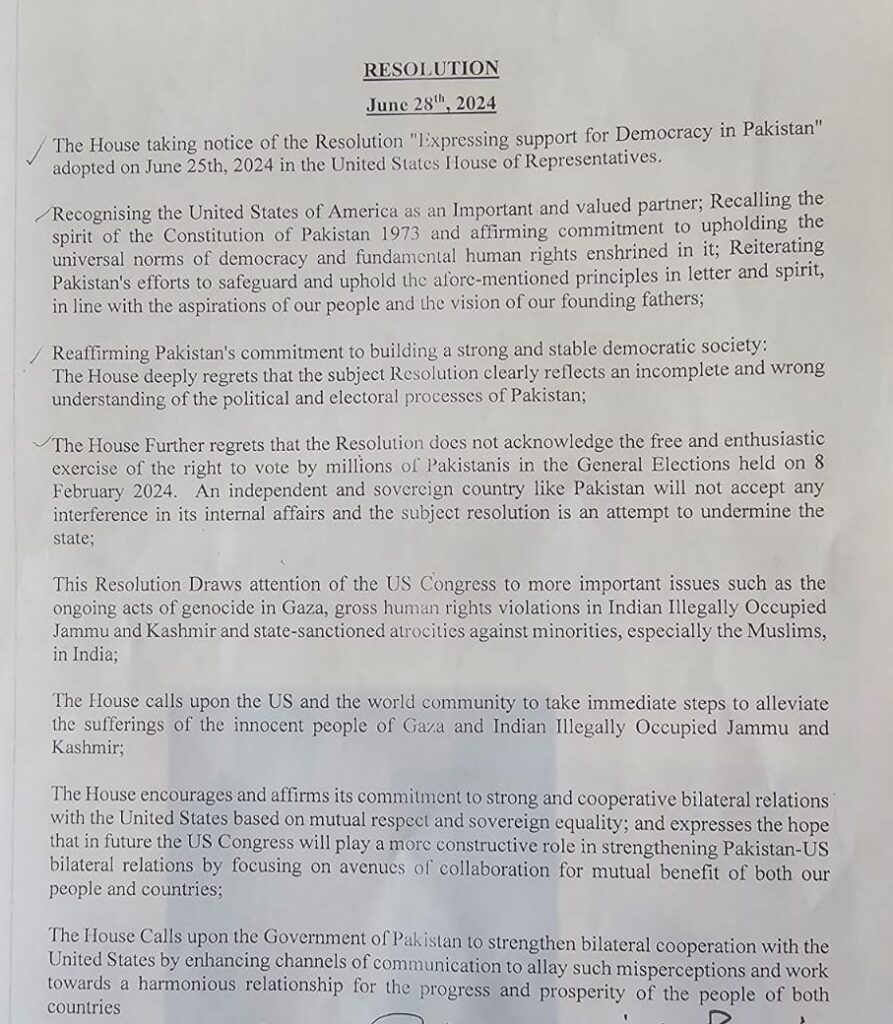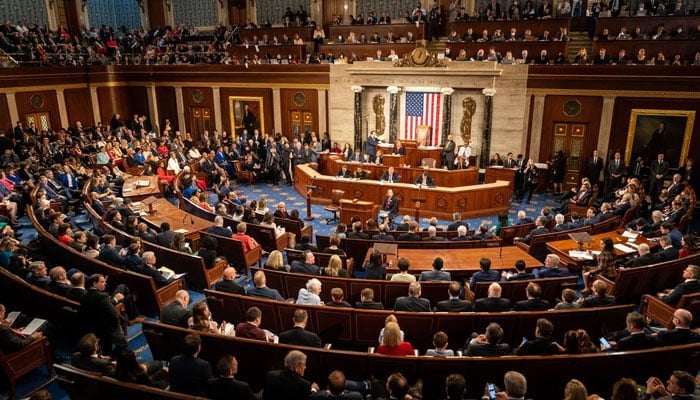“Incomplete Understanding” of Pakistan’s Political Landscape and Electoral Process is the Root of the US Resolution: FO
On Wednesday, the Foreign Office (FO) stated that the US House of Representatives’ resolution endorsing Pakistani democracy was the result of an “incomplete understanding” of the nation’s political climate and electoral system.
The US House of Representatives overwhelmingly voted in favor of a resolution expressing strong support for democracy in Pakistan (368–7), with notable bipartisan support.
The passage of resolution HR 901, “Expressing support for democracy and human rights in Pakistan,” was hailed by lawmakers as a testament to US commitment to advancing democratic values around the world.
The resolution, which was approved with the support of 98% of House members and 85% of participants, called on US President Joe Biden to work with Pakistan to protect democracy, human rights, and the rule of law.

It emphasized the significance of free and fair elections and demanded an exhaustive, impartial inquiry into any allegations of tampering or anomalies with Pakistan’s 2024 elections.
HR 901 denounced attempts to discourage Pakistani democracy engagement as well. It explicitly condemned any infringement of human, civil, or political rights as well as harassment, intimidation, assault, arbitrary detention, and internet access restrictions.
A significant turning point in US foreign policy was reached when the House decisively voted to support democratic institutions and human rights in Pakistan.
The resolution was introduced by Georgia Republican Congressman Rich McCormick. Its co-sponsor is Michigan Democrat Congressman Daniel Kildee. On November 30, 2023, the House received the original resolution, which was later changed on June 18 of the same year.
FO stated in a statement later in the day, “We believe that the timing and context of this particular resolution does not align well with the positive dynamics of our bilateral ties.”
In pursuing its own national interest, Pakistan is dedicated to the principles of constitutionalism, human rights, and the rule of law, according to FO.
Such decisions were neither constructive nor objective, the statement continued, adding, “We believe in constructive dialogue and engagement based on mutual respect and understanding.”
It said, “We hope that the US Congress will focus on avenues of mutual collaboration that benefit both our peoples and countries and play a supportive role in strengthening Pakistan-US ties.”
The resolution won’t significantly change the Biden administration’s stance toward Pakistan, according to Michael Kugelman, a South Asian affairs expert at the Wilson Center in Washington, since the government has asked for a probe into election irregularities.
But the vote does make us wonder what further laws we might see pertaining to Pakistan,” he continued.
Imran’s US fans were enthralled by the passage, and their reactions flooded social media. The update on X was also shared by the PTI.
“It indicates that US lawmakers oppose the State Department’s endeavors to bring about regime change and promote tyranny globally,” wrote one of them, going only by the name “Bol Kay lab Azad.”
“Unless implemented through the IMF,” another writer, identifying himself as a “Musketeer,” said, the resolution will not have much of an influence.
One more, going by the handle “IK Forever,” inquired as to “if the resolution would now be put before the US Senate.”
One more “Reformer” commentator advocated “translating HR 901 into financial and travel sanctions” against the sponsors, allies, and government of Pakistan.
The modified resolution’s text:
demonstrating support for Pakistani democracy and human rights.
While Pakistan is a significant and esteemed ally of the United States of America;
On December 10, 1948, Pakistan participated in the signing of the Universal Declaration of Human Rights (UDHR) and provided support for its formulation.
In light of the International Covenant on Civil and Political Rights’ (ICCPR) ratification by Pakistan on June 23, 2010;
Even though Pakistan had its first peaceful transfer of power between civilian governments led by various political parties in 2013 after the most recent phase of military dictatorship ended in 2008, the military still has an excessive amount of influence over the nation’s politics;
While election observers have previously voiced concerns about restrictions on the right to free speech and association as well as accusations of influence by the military-led establishment over the political process, most notably in 2018;
While major human rights issues in Pakistan have been repeatedly brought to light by the Department of State’s Country Report on Human Rights Practices over a number of years, such as extrajudicial, arbitrary, and unlawful killings; forced disappearances and arbitrary detention by the state or its agents; the taking of political prisoners; severe limitations on the freedom of expression and the media; and significant interference with the right to peaceful assembly and association;
As the National Assembly decided on April 9, 2022, in a vote of no-confidence, to oust Imran Khan from office as prime minister;
While Prime Minister Shehbaz Sharif advised President Arif Alvi to dissolve the National Assembly of Pakistan on August 10, 2023, in order to hold fresh elections, the Election Commission of Pakistan later declared that the elections would be delayed until February 2024 in order to redrew the National Assembly’s constituencies in accordance with the results of the 2023 Census;
On September 1, 2023, Anwaar-ul-Haq Kakar, the acting prime minister, declared that the government was dedicated to protecting and preserving the rights of every person and that it would ensure constitutional continuity until the nation’s next general elections;
While millions of Pakistanis cast ballots in the country’s general election on February 8, 2024, a record number of women, young people, and members of racial and religious minorities did so as well;
In light of the fact that credible international and local observers claimed there had been electoral violence, intimidation, the arrest of political figures, restrictions on the right to free speech and assembly, and limitations on internet and telecommunications access during Pakistan’s general election in 2024;
However, on February 9, 2024, the Department of State stated that it agreed with observers’ assessment that there were excessive limitations on the right to free speech, association, and peaceful assembly during the election; it denounced electoral violence and restrictions on the exercise of fundamental freedoms and human rights; and it demanded a thorough investigation into any fraud or meddling in Pakistan’s general elections;
While members of the Armed Forces take an oath promising to defend the Constitution and refrain from political activity, and the Pakistani Constitution stipulates that the Federal Government would be in charge and command of the Armed Forces;
While civilian command and control over apolitical military and security forces is a crucial protection for democracy; and
On the other hand, respect for human rights and fundamental freedoms, democracy, progress, and the rule of law are all interrelated and reinforce one another: Thus, here it is.
It was decided that the House of Representatives would—
- FO Declares its unwavering support for Pakistani democracy, including free and fair elections that represent the wishes of the country’s citizens;
- FO Requests that the President and the Secretary of State step up their cooperation with the Pakistani government in order to guarantee the preservation of democracy, human rights, and the rule of law;
- FO Impels the Pakistani government to respect the fundamental rights of due process, freedom of the press, freedom of assembly, and freedom of speech, as well as democratic and electoral institutions, human rights, and the rule of law;
- Denounces efforts to impede Pakistani citizens’ ability to participate in their democracy, especially where such actions involve threats, harassment, violence, arbitrary arrest, limitations on internet and phone access, or other violations of their civil, political, or human rights;
- Denounces any attempt to influence Pakistan’s judicial, political, or electoral systems; and
- FO Calls for a thorough and impartial inquiry into any allegations of meddling or anomalies in Pakistan’s election in February 2024.


Comments are closed, but trackbacks and pingbacks are open.